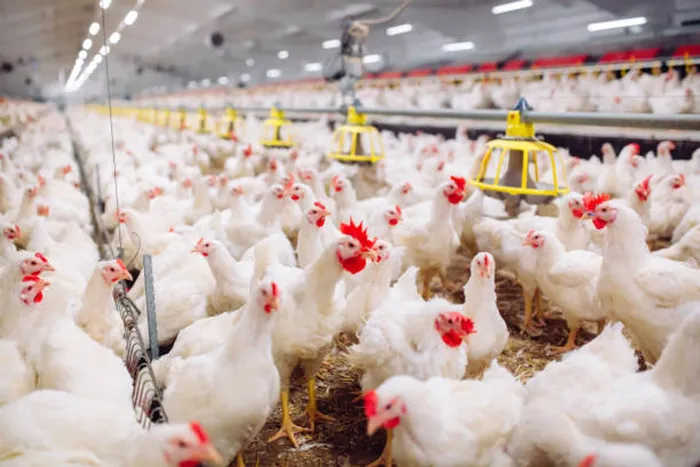Issues of trust, and a matter of time as South Africa begin vaccination of poultry
AGRICULTURE

Astral, one of South Africa's top chicken producers, has been granted permission to start its virus immunisation program. As a first phase, only a small portion of Astral's stock—roughly 5% of the total—will be vaccinated.
Image: File picture
By Thabile Nkunjana
On July 1st, 2025, the Department of Agriculture declared that the government would be starting its first-ever poultry industry vaccination program against highly pathogenic avian influenza (HPAI).
Astral, one of South Africa's top chicken producers, has been granted permission to start its virus immunisation program. As a first phase, only a small portion of Astral's stock—roughly 5% of the total—will be vaccinated.
According to data from the World Organisation for Animal Health (OAH), we are approaching the months when outbreaks often occur, thus the poultry sector has embraced this decision.
The industry had recovered from the broiler side of things following the 2023 virus outbreak that caused a 30% reduction in industry flock and cost at least R9 billion, but the egg side is still recovering. Given that the virus outbreak is approaching its peak in terms of outbreaks, the poultry sector has applauded the move to vaccinate.
However, even while the industry is pleased with the decision, many people are highly sceptical about it, and many have expressed their concerns on social media, including in a post by the agriculture minister. The primary concern is if eating items from a vaccinated bird is safe. The possibility that vaccination use could lead to mutations and resistance to the doses has also been raised on multiple occasions.
Many countries around the world have already started utilising avian influenza vaccines after their poultry industries suffered severe economic setbacks and threatening livelihoods.
Since 2005, vaccination against avian influenza has been used to prevent the infection in more than 30 countries globally. These include, among others, China, the world’s largest egg producer, Mexico and Egypt to name some.
Following the severity of the virus, which had a major impact on many countries in Europe like France, the European Union (EU-27), which is made up of 27 countries, started vaccination program in May 2023.
It's also crucial to remember that a number of countries have yet to use the vaccines on poultry. These include the United States of America, the world's top exporter of live birds and a leading poultry producer, Brazil, the world's top exporter of poultry, and the United Kingdom.
But according to recent reports, the United States is considering of implementing a vaccination program in response to the ongoing avian influenza outbreak there. There is reportedly a plan in place for possible utilisation. Additionally, Brazil has not been vaccinating because the viral outbreak there did not occur until lately. However, Brazil's agriculture minister has called for the discussion of vaccinations, which is a big step considering the Brazilians' prior concerns about this.
As was previously noted, Brazil is the greatest poultry exporter in the world, and since they are afraid of trade limitations, they have been suspicious of vaccination in their poultry. However, they could as well end up vaccinating given the recent outbreak in Brazil.
Especially in endemic and recently impacted areas, vaccination is an essential technique for reducing the impact and spread of infectious illnesses. Additionally, several countries throughout the world have previously implemented the vaccination that South Africa is starting for the past 19 years, and no proof has been offered about the risk or illnesses associated with consumption of vaccinated poultry.
Also, vaccination is used to prevent diseases like rift valley fever, clostridial disease, and lumpy valley fever in cattle. Porcine Reproductive and Respiratory Syndrome (PRRS), Porcine Circovirus Associated illness (PCVAD), Aujeszky's illness (Pseudorabies), and Classical Swine Fever are all prevented or controlled via vaccination programs for pigs.
Meat and other products from animals, including beef and pork, are ingested because they are considered safe to eat and there are no reasons yet to doubt poultry consumption because of vaccination.
It is fair to be concerned about immunisations. South Africa is part of a global trend towards greater consumer consciousness. Consumers are paying more attention to the origins of their food, the ingredients utilised in its production, and its manufacturing process.
Research on poultry specifically indicates that roughly 30% of consumers in developed countries are willing to purchase this type of meat. However, the cost is a problem because this type of meat is typically pricey and is not produced to the scale other commercial poultry production is.

Thabile Nkunjana is a senior economist under the Trade Research Unit at the National Agricultural Marketing Council.
Image: LinkedIn
* Thabile Nkunjana is a senior economist under the Trade Research Unit at the National Agricultural Marketing Council.
** He writes on his personal capacity, and does not, necessarily express of IOL or Independent Media.